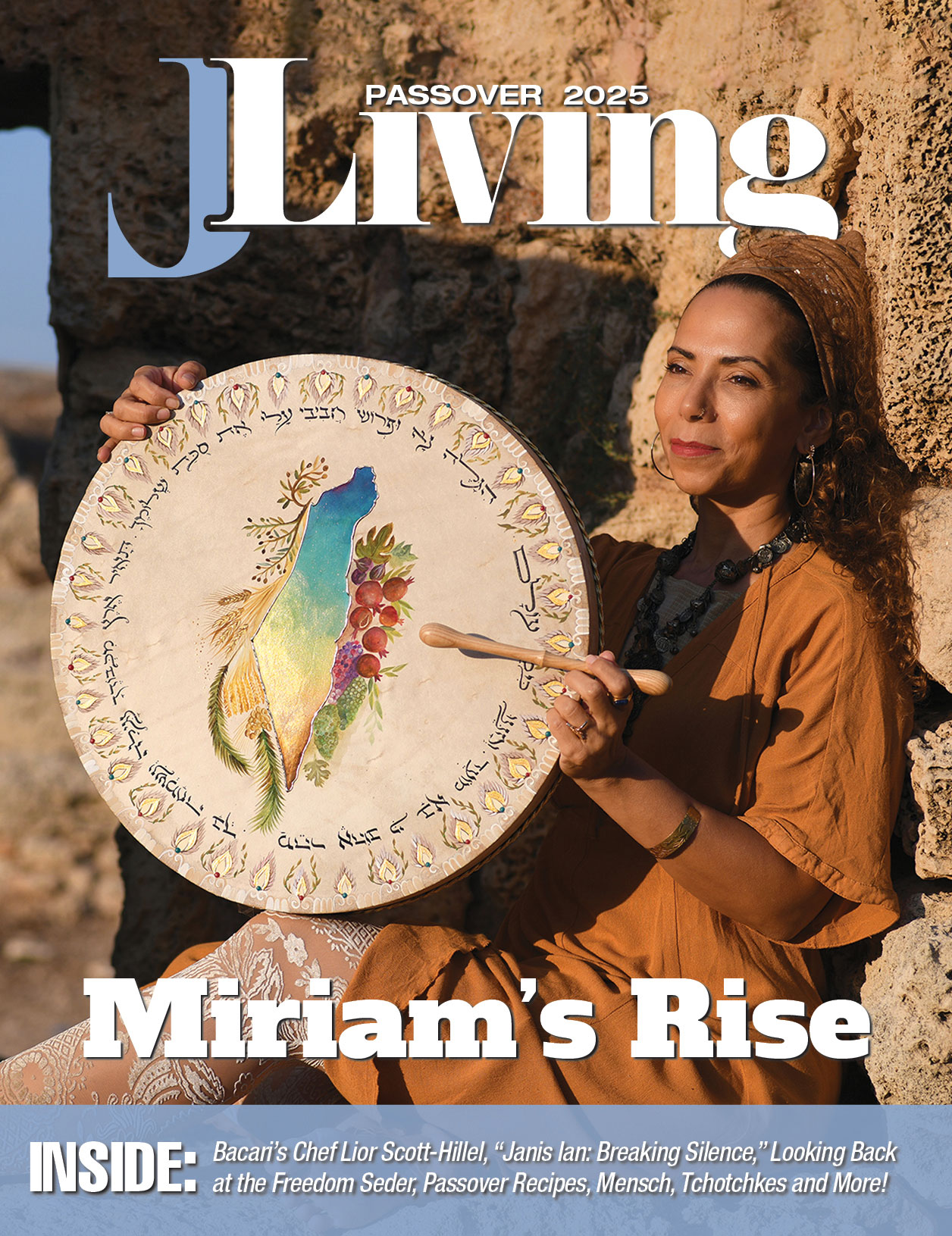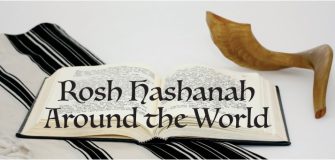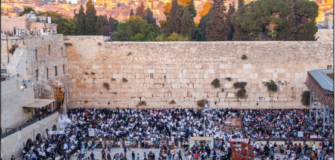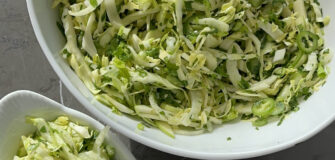Tu B’Shvat
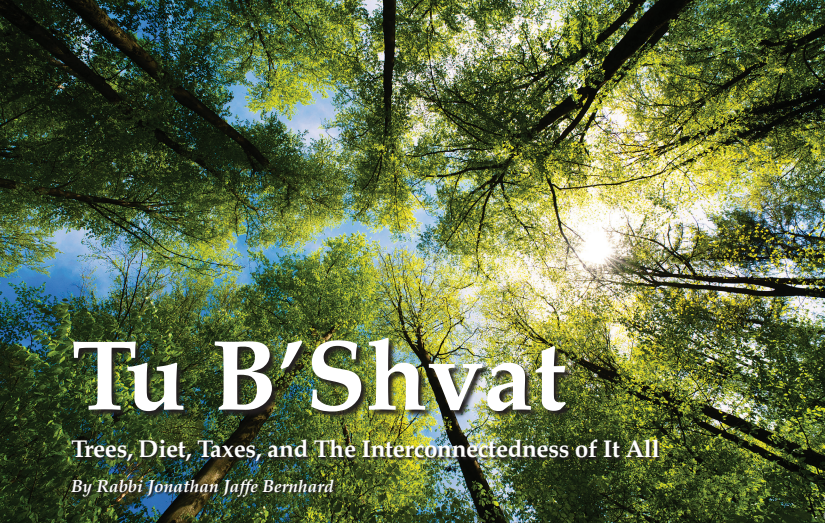
When you lay siege to a city for a long time, fighting against it to capture it, do not destroy its trees by putting an ax to them, because you can eat their fruit. Do not cut them down. Are the trees people, that you should besiege them?
Deuteronomy 20:19
I am the Lorax. I speak for the trees. I speak for the trees, for the trees have no tongues.
Dr. Seuss
On Rosh Hashanah we celebrate the world’s creation, declaring: “Ha’yom ha’rat olam! Today the world is born!” And yet we also have Tu B’Shvat – a day focused on trees and that is sweetly called the birthday of the trees. Why? Why do we need a day for trees? Because trees are special. And to uphold our sacred connection with earth’s trees at Tu B’Shvat it’s time to recognize the impact our food production has on the environment.
Trees in Mythology
With roots buried in the earth, trunks stretching forth above the ground, and branches reaching toward the sky, trees serve as a symbolic link between worlds. Hence in many myths, trees are a vital part of the structure of the universe. The Norse believed that a tree runs like an axis through this world and realms below and above. Greek folktales tell of goblins in the underworld who try to cut the roots of the tree hold of Good and Evil and the Tree of Life. This arboreal reverence continues throughout the Bible;
- Abraham planted an eshel/ tamarisk tree in Beersheba and called on the Lord there. – Genesis 21: 33.
- That person is like a tree planted by streams of water, which yields its fruit in season and whose leaf does not wither – Psalm 1:3
- The righteous will flourish like a palm tree, they will grow like a cedar of Lebanon. – Psalm 92:12

Trees in the Economy
Trees also played a vital economic role as well. The Torah commands a 10% tithe on produce as a tax to redistribute to the Levites. Tu B’Shvat, the 15th of the month of Shevat, became the April 15th-like tax date for the amount of fruit one would be paying that year. That specific date was chosen because it was in the middle of the month, hence a full moon, and by that month the majority of the winter rains have already fallen, sap is rising, and new fruits are beginning to form.
Trees in Creation and in Blessings
Given trees’ practical and symerything that I created, I created it for you. Be careful not to spoil or destroy my world–for if you do, there will be nobody after you to repair it.’” Note: it is the trees that God shows Adam as the stand in for all creation. And just as there is a blessing for the Tzar, so too there is a specific blessing for fruit trees. During the month of Nisan in which we celebrate Pesach/Passover and our liberation from Mitzrayim/Egypt, when we come across a fruit tree with its fl owers in blossom we recite: Baruch atah Adonai Eloheinu melech ha-olam shelo chiseir ba-olamo k’lum uvara vo briyot tovot v’ilanot tovim l’hitna’ot bahen b’nei Adam. Blessed are You, Our God, King of the Universe whose world lacks nothing and who made wondrous creations and beautiful trees for human beings to enjoy. This Birkat HaIlanot/Blessing for the Trees ties our sense of plenty and our well-being to the trees. How can we say our world lacks when the trees themselves bring forth food!
A tree is not just a tree. Symbolically it represents connection, wisdom, life, abundance. Practically it provides food and is a part of a microcosm of the delicately, precariously balanced physical world. It is the centerpiece of a full web of interdependence.
Trees in Liturgy and Ritual
Centuries ago, European Jewish communities understood this and instituted on Tu B’Shvat the recitation of Psalm 104, Scripture’s most soaring poetic hymn to this interconnected and diverse natural landscape of plants, water, air, and animals. Introducing the general exclamation quoted at the beginning of this article, the Psalmist waxes:
The trees of the Lord are well watered; the cedars of Lebanon that He planted. There the bird makes their nest; the stork has its home in its junipers Psalm 104: 16-17.
Therefore, to celebrate trees, we must celebrate the entire ecosystem within which they exist and support the life around them.
Typically we celebrate Tu B’Shvat by planting trees, seeds, or starting herb gardens, taking a nature hike, or doing a litter clean up (personally I like reading Dr Seuss’ The Lorax). Some people have a Tu B’Shvat seder based on the Kabbalistic practice from 16th century Tzfat. However, as lovely and meaningful as these celebrations are, given the impact humanity is having on creation, they are too pareve.
A tree is not just a tree. Symbolically it represents connection, wisdom, life, abundance. Practically it provides food and is a part of a microcosm of the delicately, precariously balanced physical world. It is the centerpiece of a full web of interdependence.
Trees in Our Diet
This year, consider celebrating Tu B’Shvat and honoring the trees by considering your diet. A main cause of climate change is deforestation by the beef industry. This summer the Washington Post ran an important piece linking the ongoing destruction of the Amazon, sometimes referred to as the world’s lungs, to the meat consumption by Americans. The forest is cleared to create land to feed the cattle to then feed Americans their meat. As long time teacher and activist Aryeh Bernstein notes: “Quite contrary to the interconnected harmony of Psalm 104, humans destroy vast stretches of trees, depleting the atmosphere of their carbon consuming protection, and rendering dozens of species extinct, profi ting from abusing cows and accelerating the pumping of greenhouse gasses into an atmosphere ever-less endowed to absorb them.” And we encourage these extractive practices with our meat consumption. Each hamburger we eat, each steak we grill, each brisket we roast sustains this industry while destroying the very creation we have been commanded by God to sustain.
Animal agriculture is responsible for at least 14.5 percent of total greenhouse gas emissions, with some estimates as high as 28 percent. It uses half the Earth’s habitable land. Factory farms pose huge threats as potential sources of antibiotic resistance and future pandemics. And the current meat production system loads farmers with fatal health eff ects and often insurmountable levels of debt. Our meat may look cheap at the grocery store, but we are all picking up the tab in ways we’re often unaware.
We remain stubbornly unaware that our diet impacts the climate. And yet we simply cannot ignore this connection any longer. Climate change is the greatest crisis humankind has ever faced, and as Jonathan Safran Foer notes in We Are The Weather, we must either let some eating habits go or let the planet go. We can’t have both.
Trees and Why this is All So Hard
This all sounds very logical and straight-forward to write down. But the truth is that talking about food and changing our eating habits is a difficult, emotional topic. Eating is profoundly intimate. We literally open ourselves up to take something in, something that we need in order to survive. Our mother’s breast is the first thing we seek when we come into this world. And food is not only associated with comfort and compassion, it also ties into our identity, our history, our culture – our very sense of self! Is it any wonder that people struggle to change their diets even when the health, ethical and environmental benefits are obvious and agreed upon? As a recent title of a New York Times op-ed declared: No One Wants to Say ‘Put Down that Burger’ But We Really Should.
A word about plant-based substitutes: When making a sandwich, my son tried a bacon alternative I was using. He chewed and looked at me quizzically and said, “Abba, you know that is not what bacon tastes like? Right?” Yes, plant-based products do not necessarily taste the same or as good as meat. For many it is just not as pleasurable, it is just not the same. But a better question than, “Does this taste the same?” is “Is the difference in pleasure I get worth the damage I inflict along with the animal’s pain and suffering?
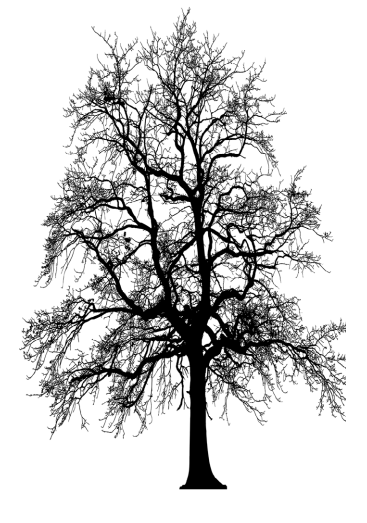
Trees and the New Tax
When it comes to steps that you and I can take as individuals, changing what we eat is the most impactful – more than the car we drive, the roof we solar panel, or the trash we recycle. And we are able to consider this change at a time when there are more and more plant-based options from which to choose, from meat-like substitutes to whole foods-based (i.e., beans, nuts, mushrooms) dishes.
As a congregational rabbi and now the executive director of Jewish Initiative For Animals, I have been blessed with a life of studying Torah and learning about the impacts of our food system. I believe one of the most effective ways to honor trees is to reduce and eliminate our beef consumption. The deforestation required to create meat is a crucial step in the process of putting it on our plates. When we reduce and eliminate, we begin aligning our food choices with our values.
Tu B’Shvat started as a financial marker in the year. It was the tree tax day. Over time it evolved. With the addition of liturgy and other rituals, followed by modern day programming, Tu B’Shvat is now a day to celebrate and raise awareness for the environment. As we consider the interconnectedness of creation, perhaps it is time to revive the tithe element of this holiday. Just as in the past, it is time for us to once again consider a renewed sacrifice from our plates. As we accept that our diet impacts our climate, this is a time for each of us to ask ourselves: what are we willing to give up from our own diet to support and honor the trees? To care about the environment means the question is no longer an “if” but a “how much if not all?” Reading the Lorax is no longer enough.

